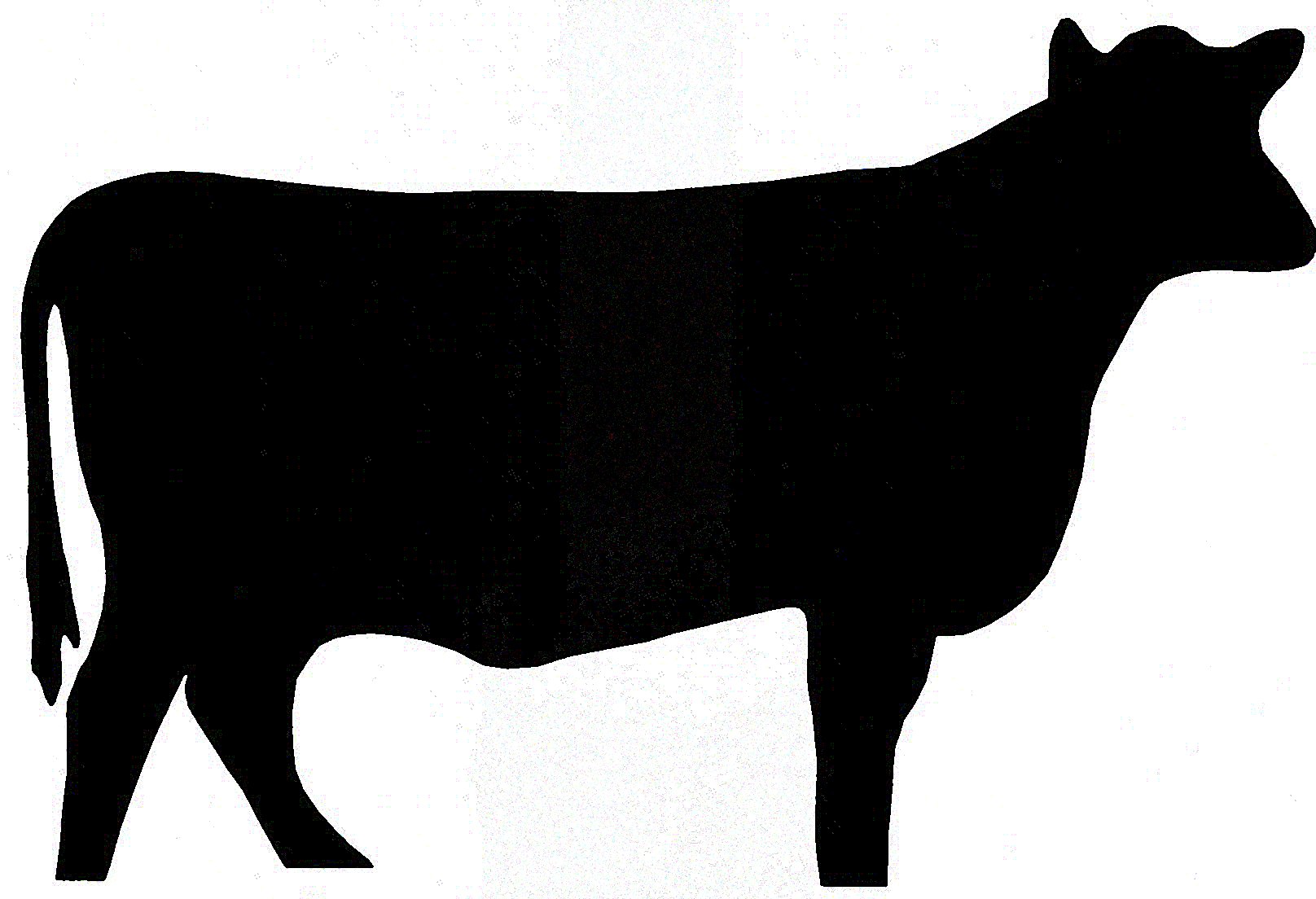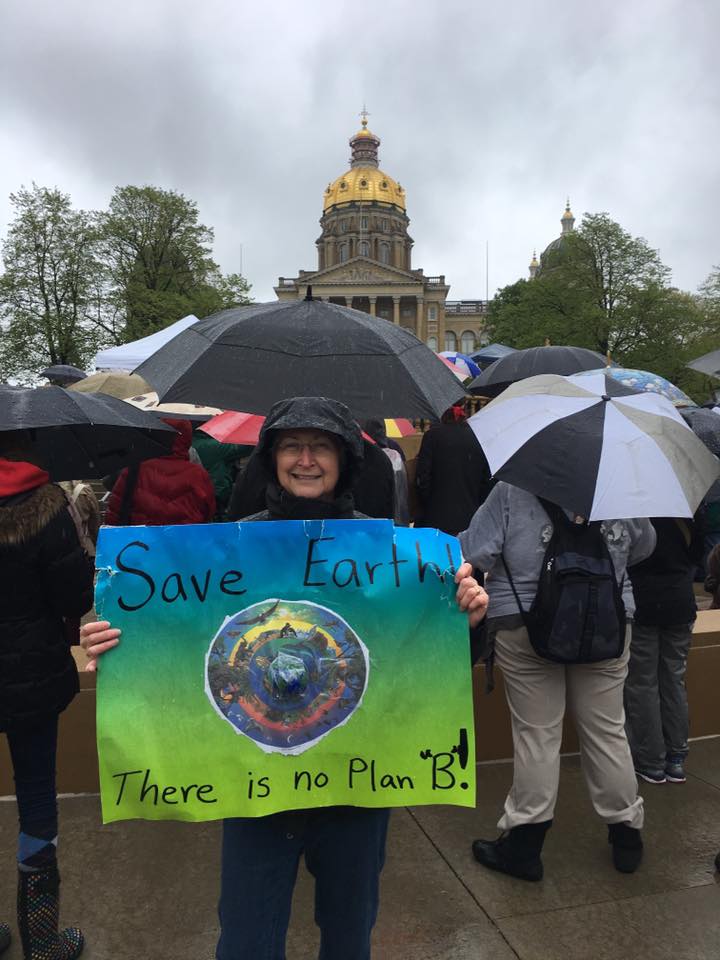April 22 is Earth Day. I hope you can join us on April 22 at 7pm for a very informative and important panel discussion "Digging into Soil Health - A New Vision for Agriculture". See details. Our guest panelists are:
Denise O’Brien, Fruit and Vegetable Farmer
Francis Thicke, Dairy Farmer and Soil Scientist
John Ikerd, Sustainable Agriculture Economics Expert
The team working on the Supreme Beef permit found an email laying out collusion between State Senator Dan Zumbach and Kayla Lyon, who is the Director of the Iowa Department of Natural Resources, in how the factory farm housing 11,600 head of cattle would be permitted. Zumbach is the father-in-law of one of the owners of Supreme Beef. The agreement between the two was that the permit application, which was incomplete and inaccurate, would be rolled out and approved in two phases. Although many of us were shocked and saddened by the revelation, Dave Swenson's tweet said it all, "In Iowa, it isn’t a conflict of interest if you aren’t conflicted. Simple as that."
Pam Mackey Taylor, Chapter Director and Newsletter Editor
What you can do to help the environment
-
Join us April 22, 7pm for a panel discussion on "Digging into Soil Health - A New Vision for Agriculture"
-
Write to your legislators and the governor about pending bills - see the details
In this issue of the Iowa Sierran
Agriculture and Factory Farms
- Senator Zumbach, DNR Director Lyon Colluded To Approve Incomplete, Inaccurate Supreme Beef Factory Farm Application
- Panel discussion on "Digging into Soil Health - A new Vision for Agriculture" on April 22, 7pm
Toxics
- Minnesota Finds Lead Contamination in Hunger Program Venison; Iowa Program May Have Similar Issue
-
PFAS found in Cedar Rapids well, Des Moines Water
Making Peace With Nature
Legislation
-
See what you can do to help advance the environmental issues at the capitol and to stop destructive legislation
Plus
- Join us for interesting and informative webinars
- Contribute to the Iowa Chapter
- Volunteer for the Iowa Chapter
- To see the archive of previous Iowa Chapter newsletters
- To see the White Pine Needle newsletter
Senator Zumbach, DNR Director Lyon Colluded To Approve Incomplete, Inaccurate Supreme Beef Factory Farm Application
Earlier this month, the Iowa Department of Natural Resources (DNR) approved the Nutrient Management Plan (NMP) for Supreme Beef despite factual evidence that the NMP is not correct and is incomplete. Over 100 public comments submitted to the DNR asking that the DNR not approve the NMP. 
In an Open Records Request, it was discovered that the application was approved behind the scenes in a private conversation between Senator Dan Zumbach and DNR Director Kayla Lyon, long before the DNR received public comments on the NMP.
They colluded in a way that 2,700 beef cattle were approved for the confinement, agreeing to a wait before the Walz family reapplied for a permit for the rest of the 11,600 animals. Significantly Senator Zumbach’s daughter is married to Jared Walz who is one of the owners/operators of Supreme Beef. The confinement is not in Senator Zumbach’s district. This certainly was not a case of a state senator performing assistance for a constituent.
“This was a done deal the minute the application was submitted. We’re sick and tired of our state elected and appointed officials colluding with the factory farm industry to make sure they get what they want, when they want it, how they want it, despite existing rules and regulations,” stated Jessica Mazour, Conservation Program Coordinator with the Iowa Chapter of the Sierra Club. “The DNR should work for the people of Iowa and the environment - not the factory farm industry.”
Sierra Club Iowa Chapter and others provided evidence of multiple errors in the NMP such as understating the amount of manure that will be produced, incorrect calculations to determine the manure application rate, improper manure storage structures, and more. In their response, the DNR dismissed these claims without providing adequate documentation to show why they dismissed our claims.
Supreme Beef is located near the headwaters of Bloody Run Creek, a designated Outstanding Iowa Waterbody, which requires more protection than other bodies of water. All of the fields in the NMP are Highly Erodible Land (HEL) which increases the threat of runoff. Any mismanagement of manure, caused by incorrect application rates or poor field practices threatens Bloody Run Creek, the Turkey River, the Mississippi River and all the way down to the Dead Zone in the Gulf of Mexico.
Further the area where the factory farm and manure application fields are sitting on karst topography, which is riddled with sinkholes, springs, and losing streams.
“We are currently reviewing the DNR’s response and will consider all possibilities for future action,” stated Wally Taylor, Legal and Conservation Chair for the Sierra Club Iowa Chapter.
Minnesota Finds Lead Contamination in Hunger Program Venison; Iowa Program May Have Similar Issue
The Minnesota Department of Agriculture has been x-raying all of the venison donated to its hunger program, looking for lead contamination. When lead is detected in the meat, the meat is tossed. Unfortunately the Iowa Department of Natural Resources does not have a program to x-ray the venison being donated to the Help Us Stop Hunger (HUSH) program. The Iowa program may have similar lead contamination issues.
Minnesota has a program similar to Iowa’s Help Us Stop Hunger (HUSH) program, where hunters can donate the deer they have killed to food pantries. Beginning in 2008, the Minnesota Department of Agriculture has been x-raying all of the donated venison, looking for lead contamination. The lead contaminates the meat when hunters use lead shot to kill the deer. Minnesota authorities have tossed thousands of pounds of venison due to the contamination.
The x-ray process detects pieces of lead so small that a person cannot detect them in the meat. The lead pieces separate from both rifle bullets and shotgun slugs. The shards can be detected up to 18 inches away from the wound caused by the bullet or slug.
In Minnesota, the x-ray processes found lead contamination in 6,700 pounds of venison out of 94,000 pounds over 10 years. Deer kept for private consumption was not x-rayed, but using the same ratios as found in the donated venison, Minnesota hunters and their families and friends are eating 500,000 pounds of contaminated meat every year.
No amount of lead is considered safe for consumption. Adults consuming lead can face nerve and kidney damage. Children exposed to lead face behavior delays, lower cognitive performance, and reduced fetal growth.
That is why Iowa needs to x-ray the venison donations for lead contamination and insist that Iowans who donate to the HUSH program use non-toxic shot.
Policy recommendations
- The work in Minnesota points out that Iowa hunters who donate to the HUSH program must use non-toxic, non-lead shot, in order to protect the health of those receiving the donated venison.
- Iowa Department of Natural Resources should aggressively x-ray the donations so that the food banks in Iowa are not distributing poisoned venison.
- Further all hunters should protect their families and friends from lead exposure by voluntarily switching to non-lead copper slugs and bullets.
Resources
For details on the HUSH program in Iowa, see www.iowadnr.gov/Hunting/Deer-Hunting
“Lead contamination found in donated venison”, Cedar Rapids Gazette, reprinted from the Minneapolis Star Tribune, March 21, 2021
National Institute of Environmental Health Sciences, National Institutes of Health,
www.niehs.nih.gov/health/topics/agents/lead/
PFAS found in Cedar Rapids well, Des Moines Water
More PFAS Detected in Iowa
The United States Environmental Protection Agency (EPA) published a guidance that states the drinking water level for PFAS chemicals should not exceed 70 parts per trillion in order to protect human health. 
Late March, the Des Moines Water Works found PFOS, one of the PFAS chemicals, in its finished drinking water at the level of 6.5 parts per trillion which is within the guideline. The Water Works is going to continue testing the water for PFAS-family of chemicals.
Earlier this month, David Cwiertny who is the director of the Center for Health Effects of Environmental Contamination of the University of Iowa reported that the Center had detected a well with high levels of PFAS. The family using the well was provided with reverse osmosis system which is expected to protect the drinking water.
Alarm bells rang in February, 2019, when the Air National Guard reported that PFAS, a toxic chemical that causes serious health problems in humans, had contaminated the groundwater near the base seven miles south of Sioux City. Although, the results were labeled as preliminary, the tests showed that the PFAS contamination had migrated off the National Guard base. Final results were published in March, 2019, confirming the initial announcement. The report indicated that the contamination most likely has moved off the guard base. It was believed that the contamination came from firefighting foams (also called aqueous film-forming foam or AFFF) used at the base beginning in the late 1980’s. The National Guard replaced its fire suppression systems that use the PFAS chemicals in 2016.
Groundwater testing at the National Guard base in Des Moines showed PFAS levels 200 times the recommended drinking water limit of 70 parts per trillion. Current tests performed on the Guard base in Des Moines hinted that a plume of contamination may be moving off the base property. The Iowa Department of Natural Resources requested further testing. Des Moines Water Works did find stormwater runoff from the airport site was carrying PFAS into the alluvium where the Water Works was drawing water.
The Iowa Department of Natural Resources will be testing about 50 sites in Iowa for PFAS contamination, out of nearly 1,100 sites that are likely near locations where PFAS was used or stored.
PFAS is a serious environmental concern
Environmentalists have become increasingly concerned about a class of chemicals called perfluoroalkyl and polyfluoroalkyl substances, often abbreviated to PFAS. There are thousands of compounds, estimated over 5000, in the PFAS class. Individual substances have the names PFOA, PFOS, GenX, PFBS, plus there are many other names and substances.
PFAS persists in the environment and does not break down. These substances are difficult to dispose of.
What’s more, they can be found in human body tissue where they accumulate and are released from the body very slowly. Exposure to PFAS has been linked to kidney and testicular cancers, immune system issues, fertility problems, low infant birth weights, low growth rates in children, learning concerns, and increased cholesterol levels. Additionally PFOS has been linked to thyroid hormone disruption.
Uses of PFAS compounds
PFAS chemicals are resistant to water, oil, grease, and heat. These chemicals have been used as fire retardants, in non-stick cookware (such as Teflon), on stain-resistant clothing (such as Goretex) and fabrics (including Scotchgard-protected fabrics), carpets (such as Stainmaster), umbrellas, tents, in food packaging such as pizza boxes and popcorn bags, in cleaning products, in polishes and waxes, in paint, in insulation for wiring, and in fire-suppressing foams. The fire-suppressing foams are used at military installations, fire training centers, airports, and some manufacturing facilities. Some industries, such as chrome plating, electronics manufacturing, and oil recovery use PFAS compounds.
EPA reports that food can become contaminated if it is grown in soil or water contaminated with PFAS, if it comes into contact with PFAS during the manufacturing and handling process, and if it is packaged in materials containing PFAS.
Although PFAS manufacturing companies have agreed to phase out manufacturing of some of the compounds (PFOA and PFOS), the products are still produced internationally and can legally be imported into the United States.
For more information
Nicole Welle, “Des Moines Water Works Detects Toxic PFAS in Drinking Water”, University of Iowa Center for Global and Regional Environmental Research, March 29, 2021, https://iowaenvironmentalfocus.org/2021/03/29/des-moines-water-works-detects-toxic-pfas-in-drinking-water/
Perry Beeman, “Scientists find ‘forever chemicals; near CR airport, push for widespread testing”, Iowa Capitol Dispatch, April 1, 2021
“PFAS – toxic chemical, hazardous to humans”, Sierra Club Iowa Chapter, www.sierraclub.org/sites/default/files/sce/iowa-chapter/air-waste-toxics/PFAS.pdf
Digging into Soil Health - A New Vision for Agriculture Panel Discussion
Soil Health. Regenerative Farming. Carbon Farming. What does this all mean and how does it impact farming here in Iowa?
More and more people are beginning to question whether industrial agriculture is good for Iowa because of the impacts it has on our air, water, rural economies and soil. But we’re still operating under the assumption that “this is the only way to farm”.
We know that’s simply not true! Farmers across the state are trying new things, planting new crops, weaning off of intensive chemical inputs, and building new local and regional farming systems. The just transition to a better agricultural system is burying its roots into our rural landscapes.
The commitment to healthy soil has been welcomed by many people including farmers and environmentalists, but like so many good ideas and noble efforts, the focus on one aspect of our life-sustaining biosphere has been too easily co-opted by think tanks, elected officials, and agribusiness interests.
With exaggerated headlines such as “building healthy soil solves everything” and “soil is the key to the climate change solution”, and “healthy soil creates beautiful landscapes”, soil health has been reduced to sound bites. But healthy soil is more than a sound bite.
We must keep in mind the complex systems - environmental, cultural, and economic - in which we farm and live. Soil can “ground” us as we seek to transform our agriculture system to one which ecology and nature are at the forefront, and the people who produce our farm products, now and in the future, are valued and respected.
As environmentalists, farmers, and eaters, we recognize that the current system is failing us all. Let’s use soil as the foundation - the grounding we need - to work for systemic change.
Join us on April 22 at 7pm for a Panel Discussion with Iowa farmers and experts who are leading the way in our transition to a regenerative agriculture system that works for farmers, workers, eaters, and the environment. We'll dig into what regenerative agriculture is with real world examples, what soil health really means, and how we transition away from our industrial agriculture system.
Our Guest Panelists are:
Denise O’Brien, Fruit and Vegetable Farmer
Francis Thicke, PhD, Dairy Farmer and Soil Scientist
Dr. John Ikerd, Sustainable Agriculture Economics Expert
Join us on April 22 at 7pm for the panel discussion - Reserve your spot today!
“Making Peace With Nature”
The United Nations recently released a report “Making Peace With Nature”, that identifies the challenges that the world is facing, from climate change, loss of biodiversity, and land degradation and pollution.
- Earth is on the way to an additional 3.5 degrees warming by 2100. [1]
- About 7 million people a year die from air pollution.[1]
- Nine out of ten people in the world breathe polluted air.[2]
- About 1 million of Earth’s 8 million species of plants and animals are threatened with extinction.[3]
- Up to 400 million tons of heavy metals, toxic sludge and other industrial waste are dumped into the world’s waters every year. [3]
- More than 3 billion people are affected by land degradation. [3]
- Only 15% of Earth’s wetlands remain intact. [3]
- About 60% of fish stocks are fished at the maximum levels.[3]
- There are more than 400 oxygen-depleted “dead zones” and marine plastics pollution has increased tenfold since 1980. [3]
The United Nations is using the report to bring together governments to discuss and implement the changes needed to reverse these problems.
United Nations Secretary-General Antonio Guterres wrote the following in his Foreword to the report:
“This report provides the bedrock for hope. By bringing together the latest scientific evidence showing the impacts and threats of the climate emergency, the biodiversity crisis and the pollution that kills millions of people every year, it makes clear that our war on nature has left the planet broken. But it also guides us to a safer place by providing a peace plan and a post-war rebuilding programme. By transforming how we view nature, we can recognize its true value. By reflecting this value in policies, plans and economic systems, we can channel investments into activities that restore nature and are rewarded for it. By recognizing nature as an indispensable ally, we can unleash human ingenuity in the service of sustainability and secure our own health and well-being alongside that of the planet. Making peace with nature is the defining task of the coming decades. We must seize the opportunity presented by the COVID-19 crisis to accelerate change. This year, several major international conferences, including on climate change, bio-diversity and desertification, provide an opportunity to increase ambition and action on recovering better and addressing climate disruption. Our central objective is to build a global coalition for carbon neutrality. If adopted by every country, city, financial institution and company around the world, the drive to reach net-zero emissions by 2050 can still avert the worst impacts of climate change. Similar urgency and ambition are needed to transform other systems, including how we produce our food and manage our water, land and oceans.”
Without a doubt these three crisis - climate change, loss of biodiversity, and land degradation and pollution - will affect all of us, rich and poor alike. We have a duty and responsibility to protect the planet for ourselves, our children and grandchildren, and their children and grandchildren.
The report indicates that there is a ray of hope of preventing and reversing the worst impacts if ambitious actions are taken by governments, businesses, and people across the globe. It will require transforming energy, water, and food systems to a more sustainable model.
For more information, see
“Making Peace With Nature”, found at www.unep.org/resources/making-peace-nature
Associated Press, “U.N. says huge changes in society needed to keep nature, Earth OK”, Cedar Rapids Gazette, February 19, 2021
Inger Andersen, “Making peace with nature is possible, if we start now”, Africa Renewal, www.un.org/africarenewal/magazine/march-2021/making-peace-nature-possible-if-we-start-now
[1] Key Messages, “Making Peace With Nature”, found at www.unep.org/resources/making-peace-nature
[2] Inger Andersen, “Making peace with nature is possible, if we start now”, Africa Renewal, www.un.org/africarenewal/magazine/march-2021/making-peace-nature-possible-if-we-start-now
[3] Associated Press, “U.N. says huge changes in society needed to keep nature, Earth OK”, Cedar Rapids Gazette, February 19, 2021
Join us for interesting and informative webinars
Webinars
Every Friday at noon, we do a Lunch and Learn livestream. See us on Facebook at "Sierra Club Iowa Chapter".  These will be recorded so you can watch them anytime. Topics will be selected based on what is happening during the week and will be announced the day before the livestream. During the legislative session, we cover issues coming before the Iowa legislature.
These will be recorded so you can watch them anytime. Topics will be selected based on what is happening during the week and will be announced the day before the livestream. During the legislative session, we cover issues coming before the Iowa legislature.
Thursday, April 22 at 7:00pm - Digging into Soil Health - A new Vision for Agriculture Panel Discussion
In case you missed our past webinars and lunch and learn sessions, you can still see them.
We hope you can join us.
Pending legislation
We are down to the final days of the legislative session. We still need your help in contacting your legislators and the governor on the following bills:
1. Legislators have introduced a number of bills to dismantle Iowa’s successful and popular Bottle Deposit Law. These attempts are not new. The grocers and distributors have been trying to dismantle the law for years. Ask your state  representative and senator to oppose any efforts to gut the bottle deposit law, ask them to increase the handling fee from 1 cent to 2 cents, and ask that they expand the bill to cover additional containers (juice, bottled water, sports drinks). Also ask your legislator to make sure that the dealers who sell the beverages take the empties, with penalties if they do not comply. Finally the law should not require the consumer to take their empty containers great distances to a redemption center rather than a more convenient dealer - the current 10-minute standard is an appropriate distance to a redemption center. It is unreasonable to expect a customer to drive 20, 30, or 40 miles round trip from the grocery store or convenience to a redemption center to return empty bottles and cans. Click here to take action.
representative and senator to oppose any efforts to gut the bottle deposit law, ask them to increase the handling fee from 1 cent to 2 cents, and ask that they expand the bill to cover additional containers (juice, bottled water, sports drinks). Also ask your legislator to make sure that the dealers who sell the beverages take the empties, with penalties if they do not comply. Finally the law should not require the consumer to take their empty containers great distances to a redemption center rather than a more convenient dealer - the current 10-minute standard is an appropriate distance to a redemption center. It is unreasonable to expect a customer to drive 20, 30, or 40 miles round trip from the grocery store or convenience to a redemption center to return empty bottles and cans. Click here to take action.
2. Visionaries set up the Missouri River Preservation and Land Use Authority to preserve land along the Missouri River, to develop comprehensive plans, and to implement strategies that emphasize the creation of multipurpose recreation areas that foster and accent the natural characteristics of the Missouri River and which provide for environmentally sound land and water use practices for land adjacent to the Missouri River. Ask the governor to veto SF185. To electronically send a letter to the governor, you must use the governor's website. E-Mail
3. Ask your legislators to support fully funding the REAP (Resource Enhancement and Protection) programs at $20 million and extending REAP beyond 2023. REAP funds protect Iowa’s natural areas, soil conservation, water quality and historical resources. REAP provides jobs, encourages tourism, protects historical and cultural resources, provides recreation opportunities, and protects Iowa’s soil and water. Money is provided to state, cities, counties and soil conservation districts. Every county in Iowa has benefited from money spent on REAP projects.
4. A bill to put onerous regulatory burdens on woodlands receiving a forest reserve property tax exemption is still active. Currently the Iowa Code gives a property tax exemption for woodlands (called forest reservations in the law) that are at least two acres and have not less than 200 trees per acre. A bill in the Iowa House - SF 587 – would place an undue regulatory burden on those landowners, making them file for their property tax exemption every 5 years, requiring a management plan, and forcing the Department of Natural Resources to inspect the property. Ask your state representative to oppose SF 587. Email, address, and phone number for House Members
5. Sierra Club members have been working to stop the expansion of the factory farm industry for years. We know that factory farms pollute our air, water, and communities. Methane digesters process manure to create biogas as an energy source. These digesters are expensive, break down easily, and allow for the continued expansion of the factory farm industry. And, the digester process does not fully break down the manure so we’re still left with a manure byproduct high in Nitrogen and Phosphorus. Ask your State Senator to oppose HF522, a bill that allows large factory farms to use methane digesters - factory farms housing at least 13,500 pigs or 5,400 cattle. Email, addresses, and phone numbers for Senators
6. Ask your state senator and state representative to extend and expand solar energy tax credits by decoupling the state solar energy system tax credit program from the federal energy tax credits, increasing the total state credit from $5 million to $10 million a year, adding money to the tax credit program to eliminate the wait-list of people who qualify for the tax credits, extending the solar energy system tax credits to 2031.
Email, address, and phone number for House Members
Volunteer for the Iowa Chapter
Almost everything we do is done by volunteers like you. If you would like to volunteer for the Iowa Chapter, please let us know by sending an E-mail to Iowa.chapter@sierraclub.org. Or sign up by using the on-line form. There are many opportunities for you to make a difference:
-
making phone calls
-
developing graphics for banners and flyers
-
working on legislative issues
-
working on elections
-
fundraising
-
organizing events
-
joining an issue committee
If you would like to join a committee on the Peoples Budget, sign up here please fill out our People's Budget Volunteer Form so we can build our organizing team for this project. A large number of Sierra Club issues require some involvement with Iowa's state budget. Budgets reflect theories of government. Iowa’s political conversation rarely moves beyond the notion that government’s primary responsibility is to grow the economy. Hence we give corporations tax breaks, but slash funding for health care, environmental protections and public interest research at our three state universities. We hold a different view of government and that is government is the trustee of all the things we share - public roads and bridges, water, wildlife, air, public universities, state parks, education and public health. Therefore, protecting, enhancing and restoring our shared public wealth is the central responsibility of government. We must tie the budget to our priorities.
If you would like to join our legislative action team, sign up here. Keep on top of what is happening at the Iowa legislature. Be alerted when you should contact your legislators about pending legislation.
If you would like to join the team on a public interest research agenda, send an e-mail to iowa.chapter@sierraclub.org. The Iowa Chapter of the Sierra Club is forming a team to design a public interest research agenda, determine needed policies, and develop a strategy to implement the public research agenda. This project will be a year-long study and design group. We are especially looking for scientists who are working in climate, public health, sustainable agriculture, and related fields.
Contribute to the Iowa Chapter
Sierra Club - our best bet for achieving bold solutions to Iowa’s environmental problems
Sierra Club is Iowa’s oldest and largest grassroots environmental organization. Not only that, we are the best bet in the state for achieving bold solutions to Iowa’s environmental problems.
We work in the courts, before Iowa’s public agencies, and in the halls of the legislature. The Iowa Chapter's effort to protect the environment takes financial support. The Chapter receives very little financial support from the national Sierra Club. Can we count on you for a donation to ensure even more victories? Your contribution will be put to work here in Iowa on issues that affect every day Iowans – water quality, clean air, protection of Iowa's soil, parks and natural areas, and a strong democracy. The Iowa Chapter is relentless in fighting back bad legislation that affects every one of us.
Your non-deductible contributions make it possible for us to fight bad legislation and to promote good legislation. We appreciate your past and on-going support of these efforts. You can make a non-deductible donation with a credit card. A non-deductible donation supports the Chapter's effective, citizen-based advocacy and lobbying programs. If you prefer, a non-deductible check can be written to the Sierra Club Iowa Chapter and mailed to:
Treasurer
Sierra Club, Iowa Chapter
PO Box 1058
Marion, IA 52302
You can also make a tax-deductible donation with a credit card. Tax-deductible activities are limited to public interest education, research and legal actions. A deductible check can be written to the Sierra Club Foundation with “Iowa Chapter” written in the memo line.
Easier yet, become a monthly donor.
Thank you for your support.
Donate your used vehicle
As the Sierra Club Foundation's Iowa Chapter continues to raise charitable funds to support its work in Iowa, won’t you consider participating in our vehicle donation program? Our partners over at CARS have made the process of donating your unused or unneeded car, truck, motorcycle, boat or RV easy, efficient and secure. They’ll take care of everything from picking up your vehicle to sending you a tax receipt for your generous gift. To learn more about The Sierra Club Foundation's Iowa Chapter vehicle donation program, please call 844-674-3772. Or visit our webpage to get started today!
Sierra Club Foundation promotes climate solutions, conservation, and movement building through a powerful combination of strategic philanthropy and grassroots advocacy. The Foundation is the fiscal sponsor of Sierra Club’s charitable environmental programs.
For more information
| When | Earliest: Latest: |
| What |
|
| Word or Phrase | Word or phrase to search for: |
| Leader | All or part of leader name to search for: |
No Matching Activities Found
Loading
| Date | Activity (click title for full description) | Sponsor | Category | Type | Difficulty | Links |
|---|
Loading ...
 Outing
Outing Club support event
Club support event  Social event
Social event  Activist event
Activist event  Multiple events (map only)
Multiple events (map only)